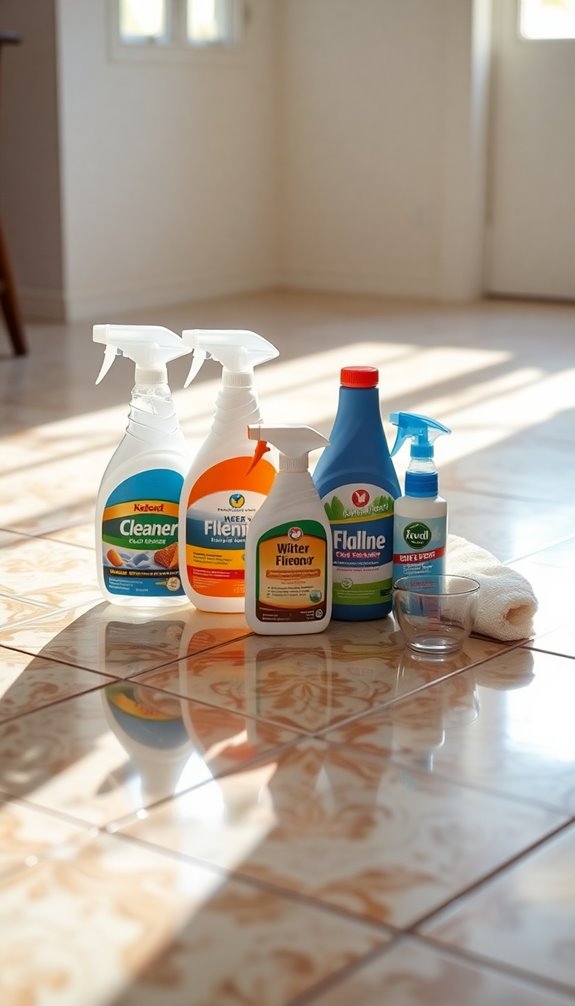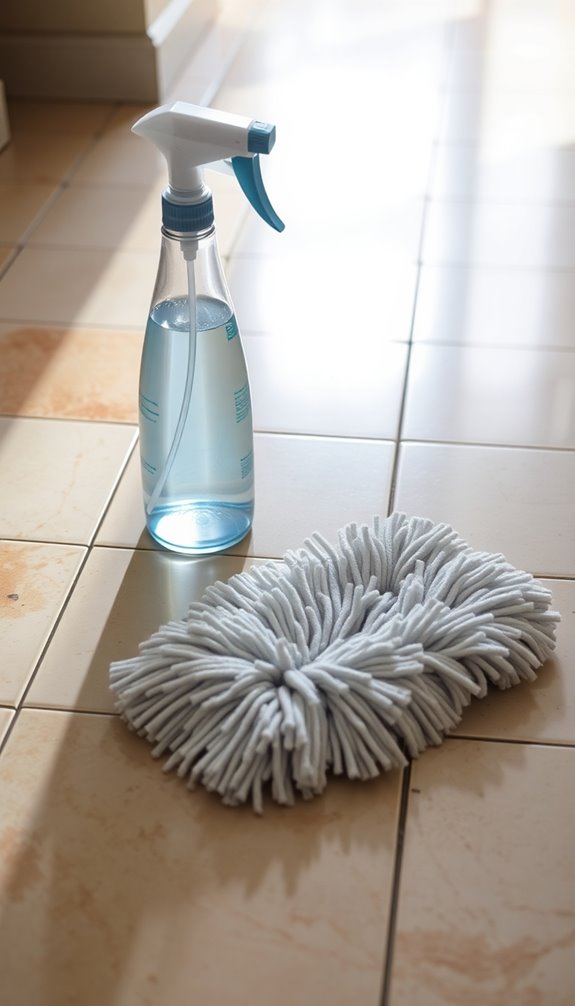Choosing the best tile floor cleaner is essential for maintaining your tiles' beauty and durability. Start by identifying your tile type—ceramic, porcelain, or natural stone—and select a pH-neutral cleaner to avoid damage. Eco-friendly options are great for safety and sustainability, but traditional cleaners can tackle tougher stains effectively. Always sweep or vacuum before cleaning and use a microfiber mop for streak-free results. Follow instructions for dilution to prevent residue buildup. Understanding your cleaner's compatibility with your grout will also enhance performance. There's more to discover about effective cleaning techniques and product recommendations for your tiles.
Importance of Tile Floor Cleaners
Tile floor cleaners play an essential role in maintaining the beauty and durability of your flooring. Proper cleaning is important to keep your tiles looking their best and to protect your investment. By using the right cleaning solutions, you can effectively maintain the appearance of both porcelain and ceramic tiles, ensuring they remain in prime condition. Additionally, utilizing homemade paste made from natural ingredients can also enhance your cleaning routine.
Regular cleaning helps prevent the build-up of dirt and grime, which can lead to staining and damage over time. It's critical to choose cleaners that are appropriate for your tile type, as using the wrong products can compromise tile integrity. For example, some cleaners designed for ceramic tiles may not be suitable for more delicate porcelain surfaces. Moreover, using natural cleaning agents like vinegar and baking soda can provide effective and safe cleaning solutions for your tiles.
Fortunately, there are eco-friendly options available, like Better Life Floor Cleaner, which use plant-derived ingredients to clean without harmful chemicals. These choices not only benefit your tiles but also promote a safer environment in your home. Additionally, selecting the right tile cleaner for different surfaces is essential for achieving optimal results.
Types of Tile Cleaners
When it comes to keeping your floors spotless, knowing the different types of tile cleaners can make all the difference.
You've got eco-friendly cleaners, like Better Life, that use plant-derived agents, and traditional options, like Lysol, which contain antibacterial properties to eliminate germs. Using natural disinfectants like vinegar can also provide an effective alternative for cleaning without harsh chemicals, as it acts as a natural antimicrobial agent.
If you're focused on maintaining tile integrity, pH-neutral cleaners are essential, as they safely clean surfaces without causing damage. Additionally, non-toxic products are beneficial for creating a safer cleaning environment.
On the other hand, acidic cleaners can tackle tough stains on ceramic and porcelain tiles but may harm natural stone.
For versatile cleaning options, consider multi-surface floor cleaners, such as Bona, designed for various tile types, including ceramic, porcelain, and sealed surfaces.
Concentrated formulas, like Fabuloso, let you customize the cleaning strength based on the grime level; just be sure to mix carefully to avoid misuse.
Finally, for a polished look, choose residue-free options like Quick Shine or Bona, which provide a streak-free finish that enhances your tiles' appearance. Additionally, using eco-friendly cleaners can contribute to a healthier planet while keeping your tiles clean.
With these choices, you can easily find the right tile cleaner for your specific needs!
Testing and Evaluation Methods

When testing tile floor cleaners, you'll want to focus on the product selection criteria to guarantee you're using the most effective options. It is essential to consider the specific care instructions for various tile surfaces to ensure the cleaner is appropriate for the material being treated. The testing process involves a hands-on evaluation with specific stains and conditions to gauge performance. Additionally, you should prioritize using non-toxic cleaning solutions to maintain a safe environment while achieving effective results. Finally, you'll measure effectiveness using clear performance metrics, helping you identify which cleaners work best for your needs. Additionally, consider using suitable cleaners tailored to each surface type for optimal results.
Product Selection Criteria
Effectiveness is a significant factor in selecting the right tile floor cleaner, and thorough testing is fundamental for evaluating performance. When choosing cleaning solutions, consider how well they tackle various stains, especially tough ones like tomato paste, red crayon, and dark soda.
In our evaluation, we tested 19 tile floor cleaners over 16 hours, with a focus on their stain removal capabilities on ceramic and porcelain tiles.
Look for cleaners that demonstrate quick drying times and minimal residue, as these features contribute to ease of use. It's important to assess the compatibility of the cleaning solutions with your specific tile type to guarantee safety and effectiveness.
A neutral pH is also important, as it helps prevent damage to your tiles while still delivering strong cleaning power.
Incorporate these cleaning tips into your product selection process: always follow the manufacturer's instructions for best results.
Testing Process Overview
To guarantee you choose the best tile floor cleaner, a rigorous testing process was implemented. We evaluated a total of 19 cleaners over 16 hours, focusing on their effectiveness, scent, ease of use, and value.
The testing process involved applying consistent stains, such as tomato paste, red crayon, dark soda, and dirt, to measure cleaning performance accurately. Using each cleaning solution according to manufacturer instructions, we meticulously observed how well each cleaner tackled these stains.
Tomato paste emerged as the most challenging stain for all cleaners, providing a true test of their capabilities. A microfiber cloth was utilized as our assessment tool, ensuring consistent stain removal evaluation across all products.
After cleaning, we also checked for drying time and any residue left behind, which is vital to maintaining the appearance of your tiles. By focusing on these key areas during the testing process, we aimed to provide you with a detailed overview of each cleaner's performance.
This way, you can confidently choose a tile floor cleaner that meets your needs, delivering exceptional cleaning on your tile surfaces.
Performance Evaluation Metrics
Performance evaluation metrics play an essential role in determining the best tile floor cleaners available. In our testing, we assessed 19 different cleaners over 16 hours, focusing on their effectiveness in stain removal, ease of use, and overall value.
We used consistent, tough stains like dark soda, tomato paste, red crayon, and dirt to evaluate each cleaner's performance. A control solution of diluted Dawn dish soap served as a baseline for effectiveness, helping us gauge how well each product performed. Significantly, tomato paste emerged as the most challenging stain, revealing the varying effectiveness of different tile cleaners.
We also prioritized quick drying times and conducted thorough residue checks post-cleaning to verify that no sticky leftovers remained on your tiles. All cleaners demonstrated quick drying times and minimal residue, making them suitable options for cleaning your tile floors without hassle.
Ultimately, the performance evaluation metrics confirmed which cleaners excelled in stain removal, ease of use, and value, allowing you to make an informed choice when selecting the best tile floor cleaner for your needs.
Choosing the Right Cleaner
When choosing a cleaner, consider the type of tile you have to guarantee compatibility with your surface.
You should also explore eco-friendly options that protect both your floors and the environment while effectively tackling stains. Selecting products that are EPA Safer Choice certified can ensure that you are using effective and environmentally friendly solutions. Eco-friendly products, which often contain natural ingredients, can help minimize harmful impacts associated with traditional cleaning products.
Finding the right balance between effectiveness and safety will make your cleaning routine more efficient. Additionally, opting for organic cleaning products can enhance your home's indoor air quality and promote a healthier living environment.
Tile Compatibility Considerations
Choosing the right tile cleaner can greatly impact both the appearance and longevity of your flooring.
You need to take into account tile compatibility considerations to guarantee you're using the best product for your specific tiles, whether they're ceramic, porcelain, or natural stone.
Here are three key points to keep in mind:
- pH-Neutral Cleaners: For sealed tiles, opt for pH-neutral cleaners to maintain surface integrity and avoid harsh chemicals that could degrade the finish or grout.
- Gentle Cleaners for Unsealed Tiles: If your tiles are unsealed, choose gentler formulas. These tiles are more susceptible to staining and moisture absorption, so you must be cautious.
- Grout Compatibility: Always verify the cleaner's compatibility with your grout types. Some cleaners might leave residues or cause discoloration, especially with porous grout.
Before applying any cleaner broadly, conduct a patch test in an inconspicuous area.
This step guarantees the cleaner won't adversely affect your tiles' appearance or integrity.
Eco-Friendly Options Available
Finding the right tile cleaner doesn't just involve compatibility; it also means considering the environmental impact. Eco-friendly cleaners, like Better Life Floor Cleaner, use plant-derived ingredients that avoid harmful chemicals, ensuring better indoor air quality.
When choosing a cleaner, look for those with a pH-neutral formula, which protects the integrity of your natural stone tiles and prevents damage from acidic substances.
Better Life Floor Cleaner also features a convenient no-rinse formula, allowing you to clean quickly and efficiently without leaving harmful residues behind. If you prefer concentrated options, Fabuloso is worth considering. It's known for its sustainability efforts and lets you customize cleaning strength based on your needs.
Switching to eco-friendly cleaners not only benefits the planet but also contributes to a healthier home environment. Many of these products contain biodegradable ingredients that break down naturally, reducing the risk of harming waterways.
Application Techniques and Best Practices

To achieve a spotless and well-maintained tile floor, it's essential to start with a clean slate by sweeping or vacuuming the surface to eliminate loose dirt and debris. This step prevents scratches during the cleaning process and sets the stage for effective cleaning.
Here are three best practices to follow:
- Use a microfiber mop with a pH-neutral cleaner. This combination effectively lifts dirt without leaving residue or damaging your tile surface, ensuring a streak-free finish. Additionally, using quality tools enhances cleaning efficiency and effectiveness.
- For tough stains, apply a specialized cleaner directly to the affected area. Allow it to sit for a few minutes, then proceed with gentle scrubbing using a soft cloth or nylon brush.
- When using concentrated cleaners, always follow the manufacturer's dilution instructions. This prevents excessive product use, which can lead to residue buildup. Regularly mopping bedroom floors ensures that dirt, dust, and allergens are effectively removed.
Additionally, remember to rinse the mop regularly during the cleaning process. This maintains cleanliness and prevents pushing dirt around the floor, ensuring a more thorough clean. Regular disinfection is also important to reduce the risk of germs and bacteria accumulating on surfaces.
Safety and Maintenance Tips
After guaranteeing your tile floors are clean, it's important to keep safety in mind while using cleaners. Always guarantee proper ventilation when using cleaning solutions to minimize inhalation of fumes. This promotes safety and helps protect your health.
When handling these products, wear protective gloves and eyewear to prevent potential irritation to your skin and eyes from harsh chemicals.
Adhere strictly to the manufacturer's label instructions for each cleaner. This guarantees safe and effective use while avoiding dangerous reactions that could arise from mixing incompatible products.
For ongoing maintenance, consider applying a silicone-based grout sealer after cleaning. This will help protect your tiles against future stains and enhance their durability.
Additionally, make it a habit to perform regular inspections of your tile surfaces. Look for cracks or chips, and address any damage promptly to maintain the integrity of your flooring.
Conclusion
To sum up, choosing the right tile floor cleaner can make a huge difference in maintaining your floors. Did you know that using the right cleaner can reduce dirt and grime buildup by up to 90%? By selecting the right product and applying it correctly, you'll not only keep your tiles looking great but also extend their lifespan. So, invest a little time in finding the best cleaner, and your tiles will thank you for it!